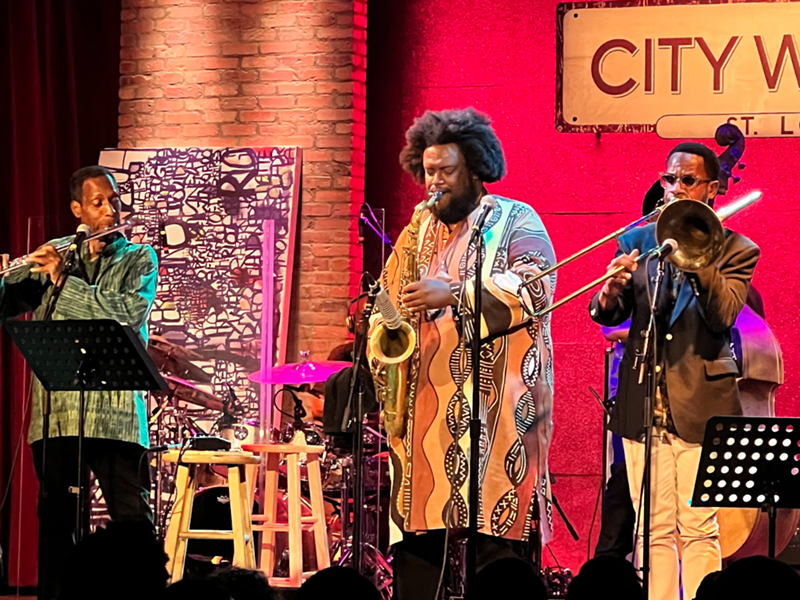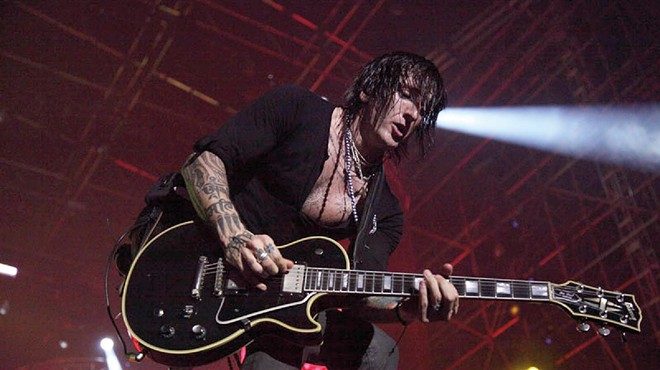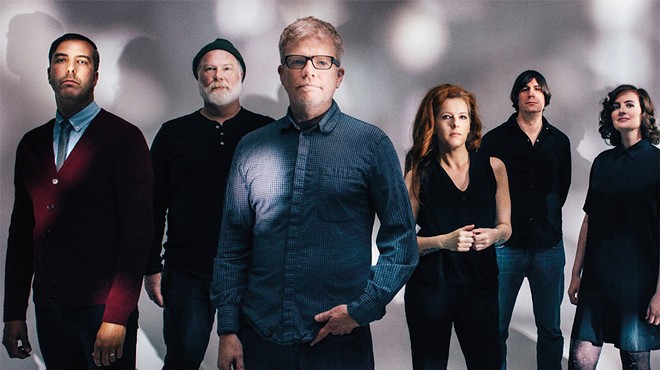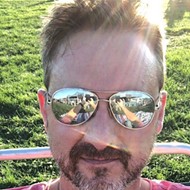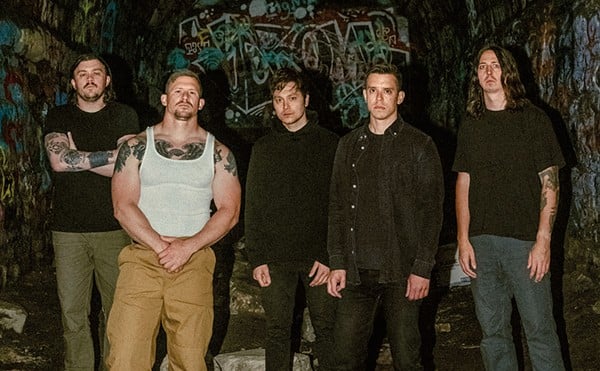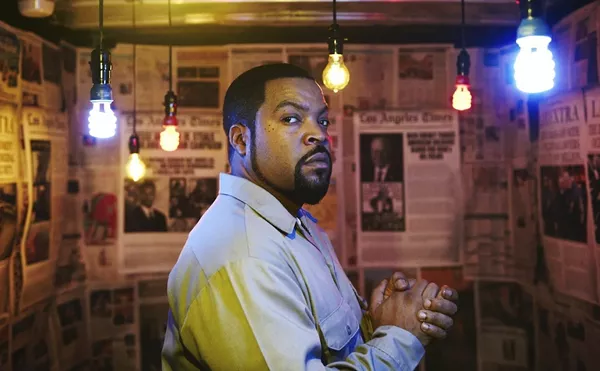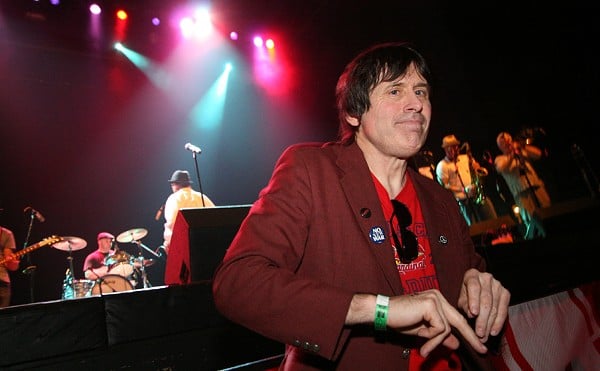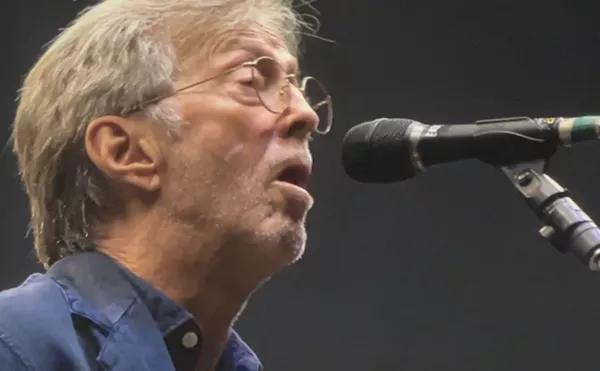“I ain’t gonna talk too much,” jazz superstar Kamasi Washington told the audience before leading his eight-piece ensemble into “Can You Hear Him” from Washington’s 2018 album Heaven and Earth. It was the first of his two sold-out Saturday night shows at City Winery, a terrific listening room for the powerhouse sound of his band.
True to his word, Washington let the music do the talking, establishing out the outset that the eight-piece ensemble would hit hard, emphasized by the delirious action of two drummers (Tony Austin and Robert Miller) who went for broke on the opening track as Washington leaned into fever-dream peals on his tenor saxophone, crescendoing to skronky blasts as keyboardist Brandon Coleman hit chords with enough propulsion to bring him out of his seat.
Washington, a long desert-colored dashiki covering his large frame, was flanked by his father Rickey Washington on flute and soprano sax and trombone virtuoso Ryan Porter (now with hair!). The older Washington, in his own dashiki and looking as though he could fit inside his son like a Russian nesting doll, exuded obvious pride in Kamasi’s remarkable playing. At one point during the show, Rickey whipped out his cellphone to record a video of his son soloing.
That spirit of collaboration was pronounced all night. Within minutes, Miller was given an extended drum spotlight, playing with incredible velocity with his snare hand, and Porter broke out on “Song for Frasier” with a lyrical, intervallic solo.
Washington made clear that “Song for Frasier” is not about the TV show but about Michelle Obama’s father and was part of the score Washington wrote for her documentary, Becoming (for which Washington was nominated for a Grammy). The song was the first showcase of the night for the great Patrice Quinn, on hand to reprise her distinctively elegant lead and orchestral background vocals from Washington’s studio albums.
Kamasi’s affection for his band is obvious, visible in how generous he was with their solos and how lovingly he watched and responded to his players; despite having played together for years, it was though he was hearing them for the first time.
It was that kind of lovefest, and Washington took a moment to address the country’s current divisiveness. “I don’t got to be like you to love you,” he said. “And I love you.” It was a sweet message that played to the venue’s communal seating, and Quinn reinforced those vibrations all night with prayer hands and Shiva-esque dance moves.
With two full drum kits, the rhythmic possibilities were endless, and the band increased the funkometer on “Street Fighter Mas,” named after Washington’s favorite video game, as Rickey stretched out on the soprano, dancing around on its frenetic edges, and Coleman supplied crystalline runs on the upper octaves. The song was ultimately met with the largest applause of the night when the audience’s old-school Nintendo disciples recognized the theme song to The Legend of Zelda. “We had the magic flute and everything” beamed Washington afterward.
Renowned bassist Miles Mosley had an especially good night, kicking off “Truth” by bowing the double-bass, slathered with flanger effects, then switching to a two-finger pizzicato technique, playing a blizzard of notes with a crisp, penetrating tone before the rest of the band kicked in, with Miller working the rims and Coleman putting the squeeze on a calypso cadence.
For most of the set, Coleman, through the stamina of his left hand, was tasked with undergirding Washington’s lines, who at times choked a scratchy voice out of his tenor, achieving a tender counterpart to the jubilant conversation he had with Porter’s trombone, which at times bunched together to quadruple the instrumental power on stage.
Washington also reminded us that we were gathered on the birthday of The Epic, his sprawling jazz opus released May 5, 2015. To celebrate, the band capped the show with one of the album’s centerpieces, “The Rhythm Changes,” a showcase for Quinn, who took the mic off the stand to sing the dry-heaving-ly gorgeous refrain while Coleman bent notes on the keys and Kamasi locked in to blow his longest solo of the night.
The physical power of the phrasing of Washington’s final blast galvanized the City Winery, resulting in a sonic climax of boundless beauty and inspiration. Epic? Damn right.
Follow us: Google News | NewsBreak | Reddit | Instagram | Facebook | Twitter

